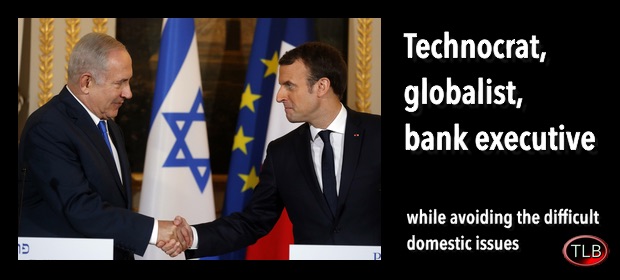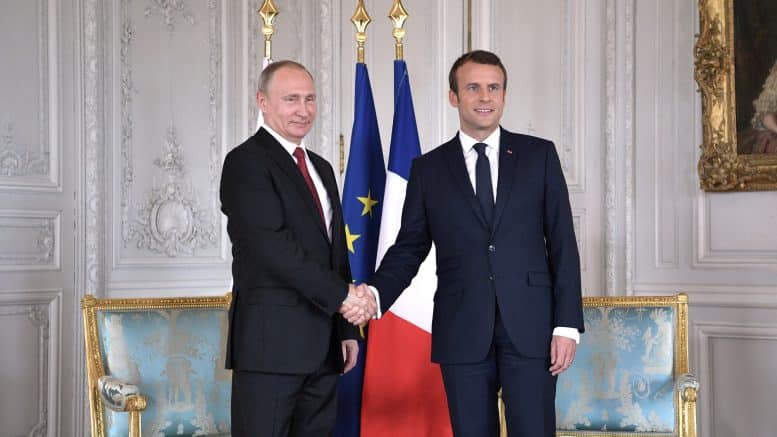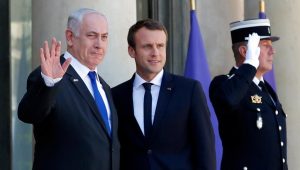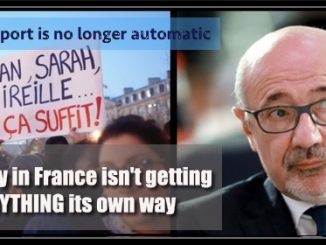
France: Technocracy Has Shaped Macron’s Style Of Governing
TECHNOCRACY NEWS
France’s Macron wants to run France like a start-up company in Silicon Valley; some are saying he could become the model leader of global governance. When Washington Post writes that “technocracy more than anything else has shaped the new president’s governing style”, Americans (and Europeans – ER ed.) should sit up and take notice. ⁃ TN Editor
********
 Emmanuel Macron, Wikipedia Commons
Emmanuel Macron, Wikipedia CommonsWashington Post
Seven months after his election, Emmanuel Macron has established himself as a force on the world stage. But at home some call him shy on the thorniest question in one of Western Europe’s most diverse societies: national identity.
The young president appears in nearly every important geopolitical discussion, issuing statements and sounding alarms. Next to a Germany mired in internal divisions – and a Britain distracted by Brexit – Macron may be Europe’s most persuasive public face. And at a time of American withdrawal, some argue that the 39-year-old ex-investment banker could even become the de facto leader of the free world.
 In any case, he loves to play the part. Next week, for instance, Macron will host a climate summit in Paris, reaffirming global commitments to the 2015 Paris agreement that President Donald Trump abandoned over the summer. In the presence of about 50 world leaders – and in the absence of Trump – he will reiterate the need for action. A particular emphasis this time around will be on private funding for climate initiatives, especially in the United States. Former New York mayor Michael Bloomberg, Bill Gates and other American philanthropists are also slated to attend (pictured).
In any case, he loves to play the part. Next week, for instance, Macron will host a climate summit in Paris, reaffirming global commitments to the 2015 Paris agreement that President Donald Trump abandoned over the summer. In the presence of about 50 world leaders – and in the absence of Trump – he will reiterate the need for action. A particular emphasis this time around will be on private funding for climate initiatives, especially in the United States. Former New York mayor Michael Bloomberg, Bill Gates and other American philanthropists are also slated to attend (pictured).
The climate summit will be only the latest of Macron’s global interventions. This week, he chastised Trump over the latter’s decision to move the U.S. Embassy in Israel from Tel Aviv to  Jerusalem, and he will host Netanyahu in Paris on Sunday. Last month, Macron inserted himself in the strange standoff between Saudi Arabia, Lebanon and Iran, persuading Saudi Crown Prince Mohammed bin Salman to permit Saad Hariri, the Lebanese prime minister, to fly to Paris and ultimately back to Beirut. Not to appear one-sided in the Gulf crisis, Macron this week also visited Qatar, where he secured nearly 12 billion euros of contracts for French companies, including the sale of 50 Airbus jets.
Jerusalem, and he will host Netanyahu in Paris on Sunday. Last month, Macron inserted himself in the strange standoff between Saudi Arabia, Lebanon and Iran, persuading Saudi Crown Prince Mohammed bin Salman to permit Saad Hariri, the Lebanese prime minister, to fly to Paris and ultimately back to Beirut. Not to appear one-sided in the Gulf crisis, Macron this week also visited Qatar, where he secured nearly 12 billion euros of contracts for French companies, including the sale of 50 Airbus jets.
Within France, however, the young leader’s image does not quite match his international profile. While the French are mostly proud to have an internationally respected leader, many remain ambivalent about a character often seen as overly timid on cultural problems raging at home. Identity in general – and Islam in particular – remain crucial issues in France, yet on both questions Macron has been quiet.
“This is one where people are asking the question: When is he going to speak?” said Frangois Heisbourg, a Paris-based political analyst and former presidential adviser on national security issues to Nicolas Sarkozy and Frangois Hollande. “He will not be able to keep silent forever. It’s one of the deepest divisions in the public debate that I’ve seen in a very long time, and it’s very ugly.”
 The French presidential elections of this year, arguably the most contentious in decades, saw Macron run against Marine Le Pen, the leader of the far-right, xenophobic National Front, whose fiery speeches regularly decried migrants and an “Islamist globalization” that, in her view, “threatened to bring France to its knees.” Macron defeated Le Pen in a landslide, but his victory did not put an end to the debate her candidacy encouraged.
The French presidential elections of this year, arguably the most contentious in decades, saw Macron run against Marine Le Pen, the leader of the far-right, xenophobic National Front, whose fiery speeches regularly decried migrants and an “Islamist globalization” that, in her view, “threatened to bring France to its knees.” Macron defeated Le Pen in a landslide, but his victory did not put an end to the debate her candidacy encouraged.
Lately, France has been consumed with the Tariq Ramadan scandal, which began with rape allegations against one of the most prominent Muslims in French public life. But the debate almost immediately transformed from a collective discussion about sexual assault into a fight over the proper place of Islam in a staunchly secular Republic. According to Le Monde, citing Elysee Palace insiders, Macron considered weighing in this week on France’s secular ideals but ultimately decided against it, instead opting to speak early next year.
In the aftermath of the election, Macron largely avoided those explosive social issues, assembling an unusual centrist governing coalition and immediately setting to work on streamlining a stagnant French economy. With a party made of novice deputies from various professional backgrounds, technocracy more than anything else has shaped the new president’s governing style.
Macron said as much at a June entrepreneurial conference in Paris: “I want France to be a start-up nation,” he said, “a nation that thinks and moves like a start-up.”
Macron’s technocratic vision has paid off. In ways few thought possible at the start of his presidency, he stared down France’s famously strong labor unions this fall and won authorization in parliament for what probably will be the most monumental market reforms in generations. Likewise, his approval ratings, after a historic nosedive in the summer, have begun to rise, reaching 50 percent this week according to Ifop, a leading French polling agency.
************
Original article
ER recommends other articles by Technocracy News, and The Spokesman-Review where this article was taken from
Image of Gates, Branson, Bloomberg courtesy of the Daily Express
Inserted image of Netanyahu, Macron courtesy of RFI
Featured image of Netanyahu, Macron: Philippe Wojazer / AP




